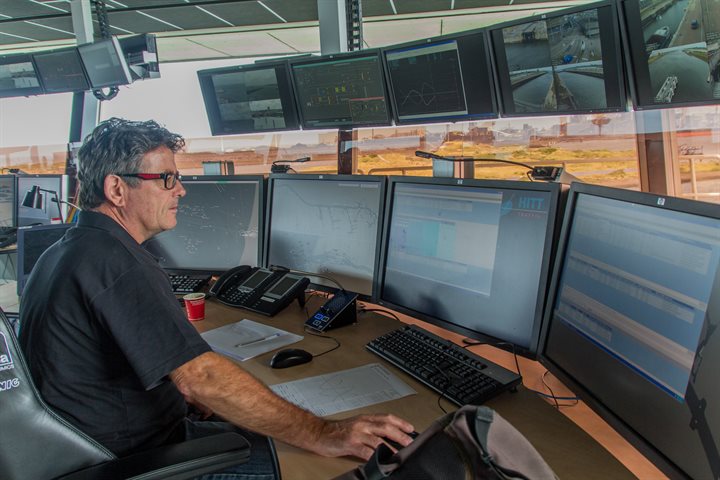Vessel Traffic Monitoring
The rise in shipping traffic and the number of off-shore wind farms means that the space in which vessels can manoeuvre on the North Sea is decreasing. This means that safety is increasingly at risk. To mitigate these risks, the Coast Guard has been given a new task: from 2025, the Coast Guard will be introducing Vessel Traffic Monitoring (VTMon). The aim of VTMon is to identify the threat of danger to shipping in and around wind farms at an early stage. This will help to prevent incidents, while the Coast Guard will be able to intervene more rapidly if things do go wrong.

VTMon duties
VTMon is a passive form of traffic management, as the future VTMon operators will make contact with vessels only where there is a threat of danger. They will be allowed to inform, advise and warn vessels outside the wind farm safety zones. Within the wind farms they will make sure the rules and regulations are observed. What does that mean in practice?
The VTMon operators provide information:
- on storm warnings or specific risks in the event of a storm, such as restrictions on the space available to perform specific vessel manoeuvres;
- on risks relating to anchorage sites, for example insufficient anchor hold in the event of a storm;
- on changes to maritime charts, for instance where a new wind farm has been built.
The VTMon operators advise on action to be taken:
- by vessels that depart from their route;
- by vessels that are on an unscheduled course, headed for wind farms;
- by vessels that are in the vicinity of wind farms when malfunctions arise, and that make preparations for incident management, such as sending an emergency tow vessel to a specific destination;
- by traffic management from the shore in the event of incidents and emergencies.
The VTMon operators provide warnings:
- if a vessel veers off course and is heading for a wind farm;
- if a vessel has engine trouble;
- for shipping, where there is little space available to perform manoeuvres if a vessel has cargo in tow;
- and provide assistance for vessels that are on an unexpected and/or hazardous course.
Possibilities of VTMon
Engineering consultants Arcadis and the Maritime Research Institute Netherlands, MARIN, have carried out research into the possibilities of VTMon in and around wind farms on behalf of Rijkswaterstaat. The research was completed in March 2023, and gives an insight into the preparations that have to be made to make VTMon in and around wind farms a reality. These included aspects such as the practical possibilities and legal implications for VTMon, both nationally and internationally. A significant conclusion was that there are no legal barriers to the introduction of VTMon. The duties of the future VTMon operators were also based on this research.
Practical experience and new research
In the initial years following 2025 we will be gaining practical experience to improve VTMon and adapt it to the growth in the number of wind farms. We will also seek international coordination in the field of VTMon. A large proportion of shipping on the North Sea is from other countries. It must also be clear to vessels that are only occasionally in Dutch waters where the new wind farms are and which rules apply to them. Other than that, we are investigating what sort of equipment and digital support the VTMon operators need and what their duties now and in the future could realistically be expected to include.
Close collaboration between Rijkswaterstaat and the Coast Guard
Rijkswaterstaat and the Coast Guard will, together, ensure that the new VTMon services are operational in 2025. This new service will be the responsibility of the Coast Guard. VTMon is an extension of what the Coast Guard already does: On stand-by 24 hours per day to provide assistance and crisis management for emergencies, and enforcement and maritime security on the North Sea. Now, the Coast Guard comes into action whenever an incident occurs. With VTMon, the Coast Guard will also be able to work pro-actively, by keeping a look-out for threats of danger, increasing the chance of preventing incidents.